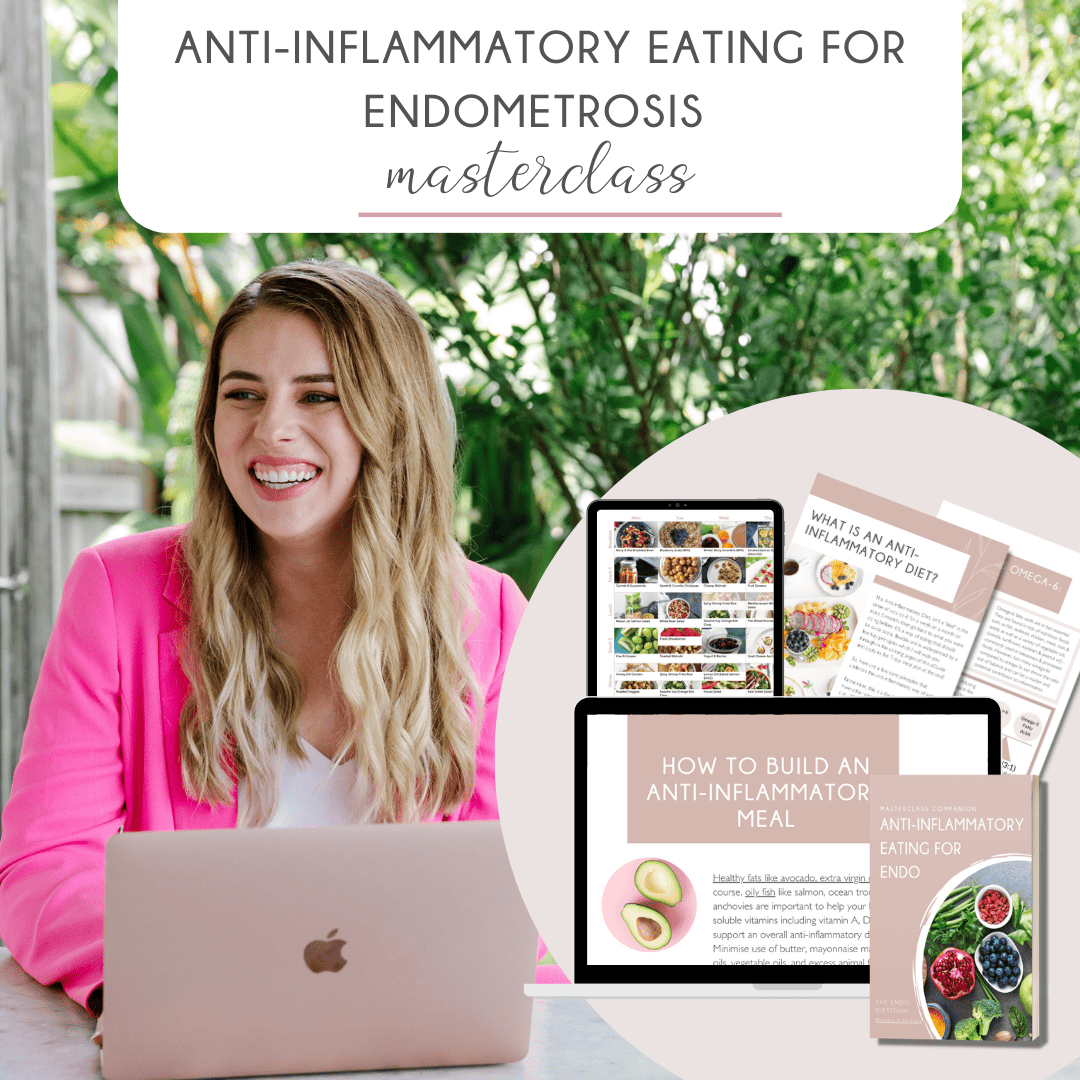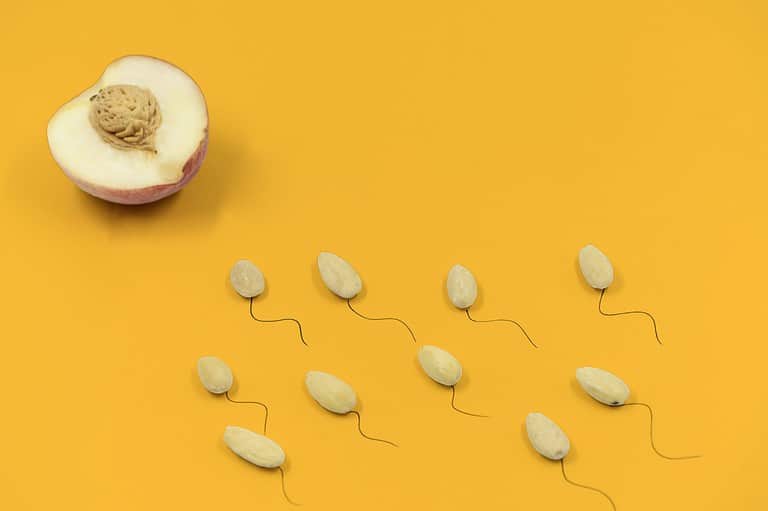Have you been visiting Dr. Google only to find a world of conflicting information regarding nutrition for endometriosis? If you are an endometriosis warrior we are sure that you have had many people telling you what to eat and what to avoid!

The million-dollar question here is “what is the best diet for endometriosis”?
If only it were as simple as that!
Let’s break down the different popular endometriosis diets, and as always, present the research behind them! So together, you can work out what the best next step is for you!
Before getting started, if you are wondering what endometriosis is, take a look at our first blog posts on this topic: endometriosis 1 and endometriosis 2.
Let’s get into it!
Psst… want the shortcut? Apply to work with us one-on-one and have a customised endometriosis friendly nutrition plan for you with an expert dietitian & nutritionist here at The Dietologist.
The Mediterranean Diet for Endometriosis
If you have followed The Dietologist for a while you would have seen us rave about the Mediterranean diet…. A LOT!
Firstly, it is by no means a “diet”, instead a way of eating, and a way of life, really! It is meant to be flexible and delicious (take my unbiased very Greek opinion).
Based on what is traditionally eaten in Mediterannean countries, like Italy, Greece and Spain, it incorporates a meal pattern rich in fresh fruit and vegetables (hello, antioxidants), wholegrains, nuts and seeds, legumes and beans and of course extra virgin olive oil and fish! Red meat, poultry and dairy foods are encouraged in smaller amounts, however you can see that nothing is off limits.

Some preliminary research suggests that the Mediterranean diet can assist women with endo in pain reduction with periods and intercourse, as well as passing bowel movements (Wnzl, Ott and Huber, 2011).
This dietary pattern is also recommended for heart disease prevention and has been shown to be beneficial for fertility, so we can only see benefits here!
Bonus, the Mediterranean dietary pattern is supportive of mental health too according to recent Australian research (Jacka et al., 2017), and is consistently on the best dietary patterns of the year lists
The Gluten-Free Diet for Endometriosis
Heard this one before?
Going gluten-free is one of the most widely circulated “diets” that endometriosis warriors hear they should follow! It is thought that a gluten free diet has the potential to affect inflammation and hormones (both of which are associated with endometriosis) (Olsen, 2020).
Gluten is the protein found in wheat, barley and rye, and in those with coeliac disease, these proteins trigger an immune response which ultimately damages the small intestine and affects absorption of nutrients.
One study saw that 75% of participants with endometriosis experienced a reduction in period pain, pain with intercourse and pelvic pain when cutting gluten from their diet for one year (Marziali et al., 2012). Now, we don’t know the exact mechanisms yet, however we do know that a gluten free diet contains fewer FODMAPs, particularly fructans from wheat. And with higher rates of irritable bowel syndrome (IBS), perhaps it is FODMAP reduction that’s helping your symptoms?
To date, we have no idea of knowing for sure!
Discover More about Endometriosis and Nutrition with our 60-minute Masterclass!
Want Scientifically Proven Nutrition and Lifestyle Strategies to Combat Endo Pain and Symptoms…
Regain Control of Your Life and Flourish Again with our 1-hour Masterclass! ONLY $75AUD !
Includes eGuide and 7-day meal plan!

The Low FODMAP Diet for Endometriosis
If you haven’t heard of the low FODMAP diet before, it was developed by researchers at Monash University in Melbourne, Australia. It is a therapeutic and temporary dietary protocol for irritable bowel syndrome (IBS) sufferers. It can help by reducing the load of carbohydrates that you are malabsorbing (i.e. not absorbing), which can contribute to excessive gas or wind, bloating, diarrhoea, constipation and abdominal pains.
To learn more about the FODMAP diet, check out another one of our blogs here.
Research tells us that those with endometriosis are 2.5 times more likely to be diagnosed with IBS – great!
Studies also report that the rate of co-occurrence of endometriosis and IBS is somewhere between 36% to 52% (Seaman et al., 2008 and Moore et al., 2017).
There are different theories as to why this is the case, from shared or overlapping symptoms of abdominal pain, to a mutual promotion effect with inflammation (i.e., one making the other worse and vice versa) or both promoting visceral hypersensitivity. An exciting study by Moore et al (2017) did show that of a sample of New Zealand women with both IBS and endometriosis, 72% reported a 50% improvement in bowel symptoms after just 4 weeks using the low FODMAP diet!
Now it is very important that you do not start a low FODMAP diet without a supportive and knowledgeable dietitian who gets both IBS and endometriosis management strategies. This is a limiting diet (only temporarily) and therefore your individual circumstance must always be taken into account beforehand
Dairy Free Diet For Endometriosis
If you have heard that you should go gluten free, then it is likely that you have also heard about going dairy free! This dietary pattern (or restriction we should say) is very common amongst the endometriosis community and definitely something we get asked in clinic.

We have established that women with endometriosis are 2.5 times more likely to have IBS, or IBS-like symptoms. This also includes a higher risk of lactose intolerance (Baron et al., 2011). Despite popular belief, lactose intolerance does NOT mean you have to say goodbye to dairy forever, in fact most people can tolerate some amount of yogurt and hard cheese due to the lactose load being reduced!
There has been no research to date that dairy causes inflammation, in fact we actually see that the combination of calcium and vitamin D (found in our dairy foods) has an anti-inflammatory effect, this one of our four pillars that are important for dietary management of endometriosis.
Soy Free Diet for Endometriosis
Soy seems like the absolute worst thing you could include your diet when it comes to endometriosis because of the phytoestrogens (also known as plant-based estrogens) that are concentrated in soy-containing foods like tofu, tempeh, soy milk, edamame beans.
Why?
Endometriosis is an estrogen-related condition, so by default, the assumption is that more estrogen coming in from your diet must be bad?
But that isn’t necessarily the case! Soy foods may actually compete with higher circulating levels of estrogen and as it has a weaker hormonal effect, it may be potentially helpful for endometriosis management!
Everyone is different with this, but it isn’t a black and white elimination, that’s for sure!
Vegan or Plant-Based Diet for Endometriosis
Last but not least we have a vegan or plant-based diet. A vegan diet follows strict no animal consumption rules. The words “plant-based” however, seem to mean different things to different people.
Some associate it with a vegan diet, whereas others suggest it means their diet is majority plant foods, with only a small amount of animal foods. Either way, these dietary patterns support a wide intake of fruit, vegetables, lentils and legumes, and meat alternatives such as tofu and tempeh.
Generally speaking, plant-based or vegan diets are rich in antioxidants due to the wide variety of colourful fruit and vegetables consumed. This, similar to a Mediterranean diet, can assist with lowering inflammation and in turn pain management in women with endometriosis. Additionally, these dietary patterns are generally lower in saturated fat, this is also known to have an anti-inflammatory effect!
However, when following strict no-animal food policies, it is important that specific nutrients like vitamin B12 or marine-based omega-3 fatty acids are replaced through either consumption of fortified foods or supplementation.
Always consult a dietitian before starting any form of supplementation.
As you can see, a variety of different dietary patterns exist for the management of endometriosis, meaning that there is no clear diet that “everyone” should follow! Want to learn A LOT more about the dietary management of endometriosis and whether any of these dietary patterns will work for you? I have you covered!
Need help with building an anti-inflammatory diet that suits your needs for endometriosis to support conception and throughout pregnancy? Check out our power-hour on-demand online Anti-Inflammatory Eating for Endometriosis masterclass, eGuide and meal plan designed for those with endometriosis by an expert endometriosis dietitian & nutritionist!

Available to start NOW for just $75 AUD (with $10 being donated to the Pelvic Pain Foundation of Australia). Can’t wait to see you there!







